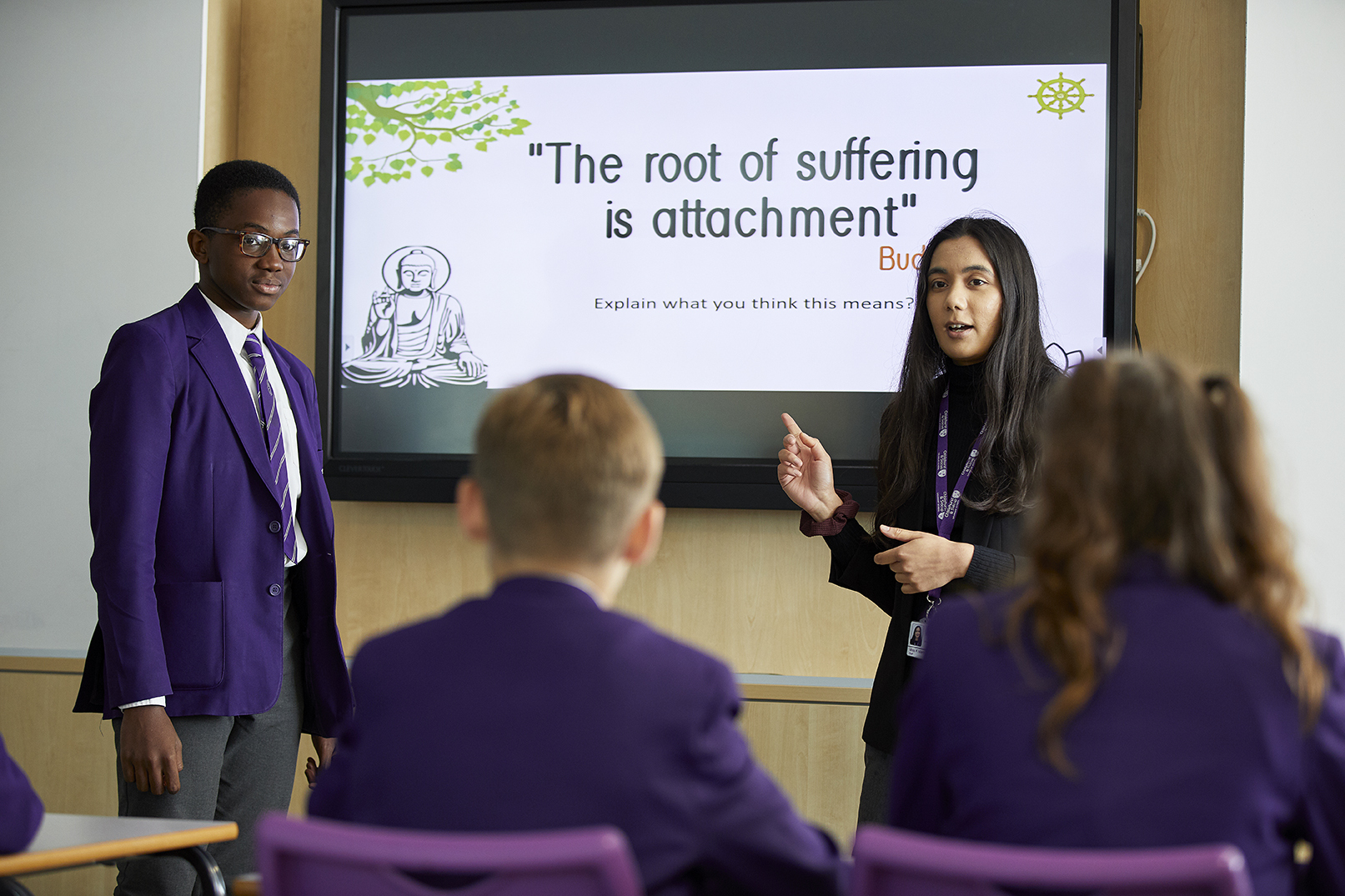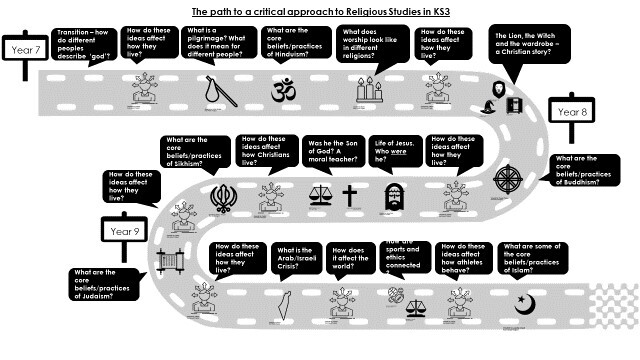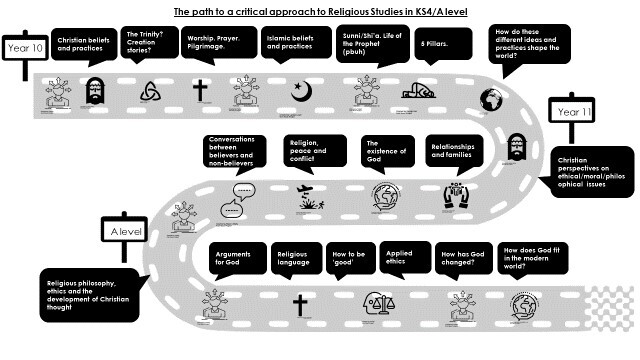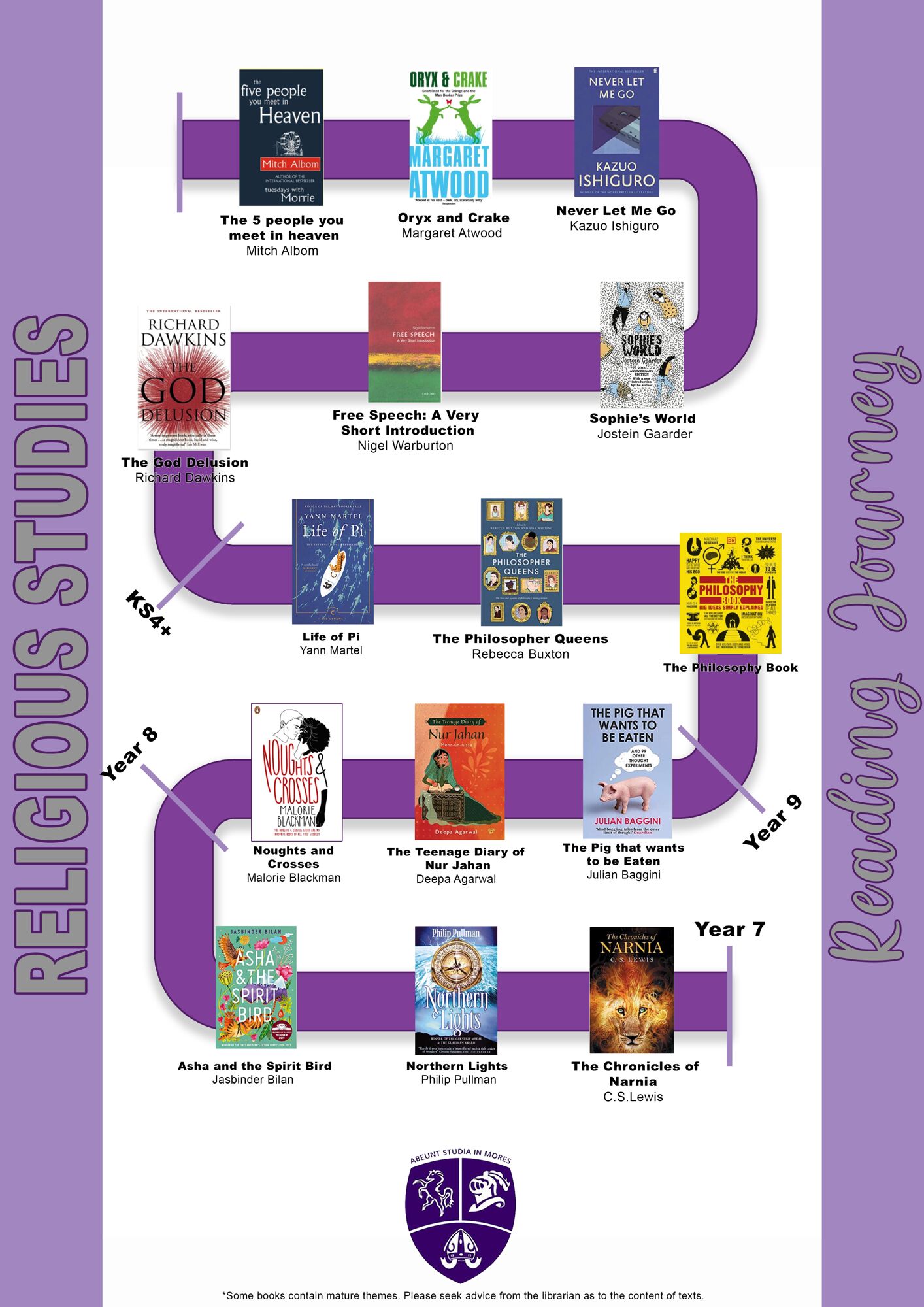- Home
- Academic Excellence
- Subject Information
- Philosophy, Religion and Ethics
Philosophy, Religion and Ethics

Curriculum Vision
Purpose and Aims
‘All children need to acquire core knowledge and understanding of the beliefs and practices of the religions and worldviews which not only shape their history and culture but which guide their own development. The modern world needs young people who are sufficiently confident in their own beliefs and values that they can respect the religious and cultural differences of others, and contribute to a cohesive and compassionate society.’
We want that all of our students will be able to start the sentence, “I think that….” with a critical confidence based on a secure knowledge of not only their own thinking but that of others.
Teaching and learning approach
Modern and engaging – Students gain a deeper understanding of religion and worldviews, through substantive and disciplinary knowledge, while exploring the impact that belief has on the world in which we live. This is done through lessons that use a strong mix of thematic, narrative and topical content. The students also investigate philosophical and ethical issues in the modern world. These different threads all help to bring life in the modern world into a sharper focus.
Designed to inspire – Thought provoking content that explores relationships and families, peace and conflict, belief in God and non-religious belief and worldviews. In particular, we want our lessons to be a springboard for a lifetime of learning and questioning.
Skills for today’s world – Religious Studies develops the vital skills of critical evaluation and analysis to engage with the world in which we live, allowing the students to make links, understand different viewpoints and engage on a deeper level with the issues of the day. It is here that the personal knowledge, firmly supported by substantive knowledge will be most evident. These skills will serve them throughout their lives in a myriad of different careers.
Curriculum Implementation
Following the Bexley Agreed Syllabus, KS3 pupils embark on a critical study of the beliefs and practices of all the major religious worldviews, delivered in lessons that are a good mix of thematic, topic based learning, as well as looking some of the ethical issues facing the world of sports. At KS4, following the OCR J625 curriculum, they focus on Christianity and Islam and philosophical and ethical issues in the world today. At KS5, again, following the OCR board, H573, this course of study is further deepened and contextualised through a study of the philosophy of religion, the thorny subject of morality and an examination of how Christian thought has developed and changed over time.
Curriculum Learning Journey


Curriculum Reading Journey

Summary of Study at each Key Stage
Key Stage 3
Y7
- Transition – thematic look at different beliefs about ‘god’
- Pilgrimage – thematic look at different religious practices
- Hinduism – topic study of beliefs and practices
- Worship – thematic look at different religious practices
- Christian elements in The Lion, the Witch and the Wardrobe
Y8
- Buddhism – topic study of beliefs and practices of Buddhists
- Life of Jesus -– topic study of the teachings and example of Jesus Christ
- Sikhism – topic study of beliefs and practices of Sikhs
Y9
- Judaism – topic study of beliefs and practices
- Arab/Israeli Conflict – Global issues, examination of roots and repercussions
- Sports and ethics – Global issues, topic study of issues and repercussions
- Islam – topic study of beliefs and practices of Muslims
Key Stage 4
OCR J625 GCSE – /01 Christian beliefs and practices; /02 Islamic beliefs and practices; /06 Christian perspectives
Key Stage 5
OCR H573 A level - /01 - Philosophy of religion; /02 – Ethics; /03 – Development of Christian Thought
Opportunities Beyond the Classroom
Key Stage 3
Y7 trip to Canterbury Cathedral
Philosophy Club
TED talks
Key Stage 4
TED talks
Philosophy Club
Key Stage 5
FACEBOOK page – Chis and Sid Moral Sciences Club
A level Conference
Prefecture – various opportunities – running Philosophy Club
Assessment
Key Stage 3
Termly topic based assessments, essay based; book marking; homework marking – peer and self-assessment
Key Stage 4
End of topic tests – exam based – tests knowledge and exam skills; homework – tests knowledge and exam skills
Key Stage 5
End of topic tests – exam based – tests knowledge and exam skills; homework – tests knowledge and exam skills
Additional Reading and Website Recommendations
Key Stage 3
KS3 Religious Studies - BBC Bitesize
Key Stage 4
GCSE Religious Studies - OCR - BBC Bitesize
GCSE Learning and Revision | GCSEPod
Key Stage5
Homepage | peped (teachable.com)
Logos | Online (divinityphilosophy.net)
Revision Strategies and Materials
Key Stage 3
- Knowledge Organisers
- Mindmaps, flashcards, lists of keywords
- A quiet place to revise. This is about limiting distractions so the student is able to focus on the revision. This can be a separate workspace away from areas of the house usually used for other things, like a TV room, or limiting access to computers or mobile phones.
Key Stage 4
- Z:\Humanities\RS\GCSE\GCSE RS New J625\Revision – Student Shared Area with exam technique advice
- Z:\Humanities\RS\GCSE\GCSE RS New J625\Revision\Y10 Revision/2023
- Z:\Humanities\RS\GCSE\GCSE RS New J625\Revision\Y11 Revision\2023
- U sheets, Rolladice – used in class, available in Revision folder
- Exam technique – available in Revision folder
- A quiet place to revise. This is about limiting distractions so the student is able to focus on the revision. This can be a separate workspace away from areas of the house usually used for other things, like a TV room, or limiting access to computers or mobile phones.
Key Stage 5
- Z:\Humanities\RS\A Level\A level H573\Past Papers
- A quiet place to revise. This is about limiting distractions so the student is able to focus on the revision. This can be a separate workspace away from areas of the house usually used for other things, like a TV room, or limiting access to computers or mobile phones.
Subject Specific Equipment Requirements
Key Stage 3
- Blue, black, purple and red pens
- Colouring pencils
- Eraser
- Ruler
- Highlighters.
Key Stage 4
- See above
Key Stage 5
- See above
Ways in which parents can support students
Key Stage 3
- Take an interest in reading their book and discussing the content of their lessons with them. Please oversee homework completion. When this homework involves research, please support them in their quest for information, trying to introduce them to a wide range of sources in order to try to personalise their work.
- Try to provide a place for work/revision that is as free of the distractions of daily life as possible – dining room table, clean desk in students room, etc
- Visits to places of religious/philosophical significance
- Encourage the children to make links between what they are learning in RS and other subjects in the school or in their own lives.
Key Stage 4
- See KS3 parental support strategies
- The Story of God with Morgan Freeman – television series exploring different ways faith communities deal with the divine
Key Stage 5
- See KS3 parental support strategies
- BBC Radio 4 - In Our Time
- BBC Sounds - The Reith Lectures - Available Episodes
- BBC Sounds - The Forum - Available Episodes
- The Good Place – television series exploring moral philosophy
- The Story of God with Morgan Freeman – television series exploring different ways faith communities deal with the divine